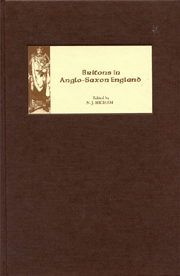Book contents
- Frontmatter
- Contents
- List of Illustrations
- List of Tables
- Contributors
- Dedication
- Acknowledgements
- Abbreviations
- 1 Britons in Anglo-Saxon England: An Introduction
- 2 Anglo-Saxon Attitudes
- 3 Forgetting the Britons in Victorian Anglo-Saxon Archaeology
- 4 Romano-British Metalworking and the Anglo-Saxons
- 5 Invisible Britons, Gallo-Romans and Russians: Perspectives on Culture Change
- 6 Historical Narrative as Cultural Politics: Rome, ‘British-ness’ and ‘English-ness’
- 7 British Wives and Slaves? Possible Romano-British Techniques in ‘Women's Work’
- 8 Early Mercia and the Britons
- 9 Britons in Early Wessex: The Evidence of the Law Code of Ine
- 10 Apartheid and Economics in Anglo-Saxon England
- 11 Welsh Territories and Welsh Identities in Late Anglo-Saxon England
- 12 Some Welshmen in Domesday Book and Beyond: Aspects of Anglo-Welsh Relations in the Eleventh Century
- 13 What Britons Spoke around 400 AD
- 14 Invisible Britons: The View from Linguistics
- 15 Why Don't the English Speak Welsh?
- 16 Place-Names and the Saxon Conquest of Devon and Cornwall
- 17 Mapping Early Medieval Language Change in South-West England
- Index
8 - Early Mercia and the Britons
Published online by Cambridge University Press: 12 September 2012
- Frontmatter
- Contents
- List of Illustrations
- List of Tables
- Contributors
- Dedication
- Acknowledgements
- Abbreviations
- 1 Britons in Anglo-Saxon England: An Introduction
- 2 Anglo-Saxon Attitudes
- 3 Forgetting the Britons in Victorian Anglo-Saxon Archaeology
- 4 Romano-British Metalworking and the Anglo-Saxons
- 5 Invisible Britons, Gallo-Romans and Russians: Perspectives on Culture Change
- 6 Historical Narrative as Cultural Politics: Rome, ‘British-ness’ and ‘English-ness’
- 7 British Wives and Slaves? Possible Romano-British Techniques in ‘Women's Work’
- 8 Early Mercia and the Britons
- 9 Britons in Early Wessex: The Evidence of the Law Code of Ine
- 10 Apartheid and Economics in Anglo-Saxon England
- 11 Welsh Territories and Welsh Identities in Late Anglo-Saxon England
- 12 Some Welshmen in Domesday Book and Beyond: Aspects of Anglo-Welsh Relations in the Eleventh Century
- 13 What Britons Spoke around 400 AD
- 14 Invisible Britons: The View from Linguistics
- 15 Why Don't the English Speak Welsh?
- 16 Place-Names and the Saxon Conquest of Devon and Cornwall
- 17 Mapping Early Medieval Language Change in South-West England
- Index
Summary
THIS essay considers some aspects of the ethnic composition of the Mercian kingdom and hegemony to the death of Penda, king of the Mercians c.633–c.655. The early Mercians appear in Bede's Historia ecclesiastica as an ‘English’ group; we are told that they are of Anglian stock, and Bede treats them throughout as a part of the gens Anglorum, if often a morally dubious part. It will be argued here that the situation was rather more complex than Bede implies. Three zones of interaction between the Mercian kingship and the Britons will be proposed: firstly an ‘outer zone’ consisting of kingdoms which formed part of and contributed to Penda's hegemony; secondly, an ‘inner zone’ made up of groups more closely tied to the Mercian kingship; and finally, a ‘core zone’, the people of the early Mercian kingdom proper. It will be argued that as one moves from the periphery to the centre, British elite culture becomes less prominent, but that even in the heartland of the earliest Mercian kingdom there was in the early seventh century a British element among the elite.
The paucity of literary sources relating to Mercia is well-known and has long been an impediment to the study of this kingdom. Those texts which exist are mainly narratives, Bede's Historia ecclesiastica being the principal. Furthermore, the literary sources we possess are of an almost exclusively non-Mercian origin.
- Type
- Chapter
- Information
- Britons in Anglo-Saxon England , pp. 91 - 101Publisher: Boydell & BrewerPrint publication year: 2007



